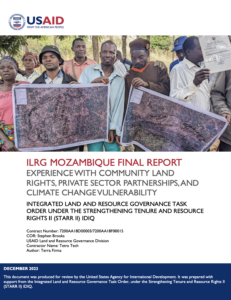 From 2018 – 2023, the United States Agency for International Development (USAID) supported efforts to document and strengthen community land use rights in Mozambique under the Integrated Land and Resource Governance (ILRG) program. This work was built on the earlier USAID-funded Responsible Land-Based Investment pilot project implemented from 2017-2018.
From 2018 – 2023, the United States Agency for International Development (USAID) supported efforts to document and strengthen community land use rights in Mozambique under the Integrated Land and Resource Governance (ILRG) program. This work was built on the earlier USAID-funded Responsible Land-Based Investment pilot project implemented from 2017-2018.
The work in Mozambique, led by consulting firm Terra Firma and implemented by a series of local community-based organizations (CBOs) and non-governmental organizations (NGOs), was grounded in a strong political economy approach that identified existing opportunities for progress within Mozambique’s complicated land and resource governance space. At the national level, ILRG provided inputs to the national level land policy discussions, helping to ensure the National Land Policy published in 2022 maintained protections for community land use rights. At the local level, ILRG worked with a number of private sector partners to address land-based disputes and constraints within their supply chains.
In addition to work with the private sector, ILRG also worked with communities and district government in Sofala province to ILRG MOZAMBIQUE FINAL REPORT 1address long term land use needs and disaster risk reduction mechanisms among host and displaced communities in flood prone areas impacted by yearly cyclones. In 2019, two cyclones hit Mozambique – Idai in March and Kenneth in April – which caused extensive property damage, loss of life, and long-term food and livelihoods security issues. Almost 100,000 people were displaced by these events, many permanently, who are now trying to rebuild their lives in new resettlement locations. ILRG worked to increase the capacity of decentralized authorities, primarily at the district level, to plan for, manage, facilitate, and/or mitigate land-related issues that commonly arise in contexts in which either temporary or permanent involuntary displacements are caused by external drivers such as natural disasters.
The following sections summarize each of these activities in turn, highlighting implementation approaches, success, and challenges faced. Section 8 outlines ILRG’s gender equality and social inclusion approach, which was a cross-cutting theme across activities, and Section 9 provides an overview of ILRG’s overarching policy engagement at the national level. Section 10 lays out plans for activity sustainability and continuity now that USAID support for the work has ended. Section 11 highlights implementation challenges faced during the course of the activities, which spanned COVID-19 and multiple deadly cyclones in the country. Finally, Section 12 summarizes lessons learned and directions for future work. Sections on the Grupo Madal, Green Resources, and the LAMADI Sofala disaster risk reduction work are also available as their own standalone reports.

